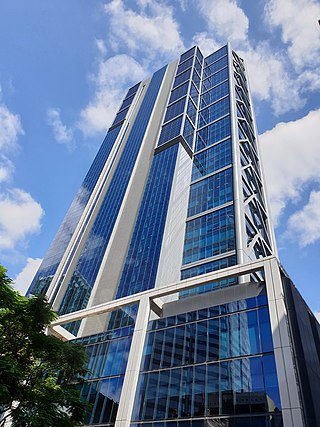
BHP Group Limited, also known as Broken Hill Proprietary Company and formerly as BHP Billiton is an Australian multinational mining and metals public company that was founded in August 1885 and is headquartered in Melbourne.
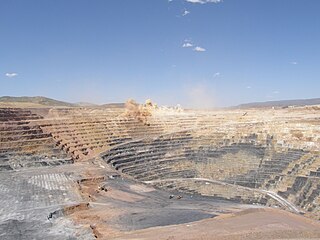
Open-pit mining, also known as open-cast or open-cut mining and in larger contexts mega-mining, is a surface mining technique that extracts rock or minerals from the earth.

Cobalt is a town in Timiskaming District, Ontario, Canada. It had a population of 989 at the 2021 Census.

Vale Canada Limited is a wholly owned subsidiary of the Brazilian mining company Vale. Vale's nickel mining and metals division is headquartered in Toronto, Ontario, Canada. It produces nickel, copper, cobalt, platinum, rhodium, ruthenium, iridium, gold, and silver. Prior to being purchased by CVRD in 2006, Inco was the world's second largest producer of nickel, and the third largest mining company outside South Africa and Russia of platinum group metals. It was also a charter member of the 30-stock Dow Jones Industrial Average formed on October 1, 1928.
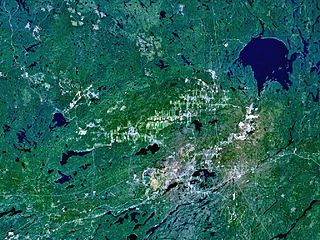
The Sudbury Basin, also known as Sudbury Structure or the Sudbury Nickel Irruptive, is a major geological structure in Ontario, Canada. It is the third-largest known impact structure on Earth, as well as one of the oldest. The structure, the eroded remnant of an impact crater, was formed by the impact of an asteroid 1.849 billion years ago in the Paleoproterozoic era. The ores of the Sudbury Basin are known to contain nickel, copper, gold, silver, platinum, palladium, rhodium, iridium, and ruthenium.
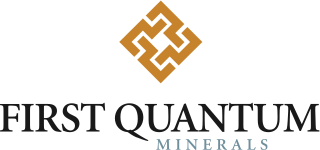
First Quantum Minerals is a Canadian-based mining and metals company whose principal activities include mineral exploration, development and mining. Its main product is copper, which accounts for 80% of revenues as of 2016.

Vale, formerly Companhia Vale do Rio Doce, is a Brazilian multinational corporation engaged in metals and mining and one of the largest logistics operators in Brazil. Vale is the largest producer of iron ore and nickel in the world. It also produces manganese, ferroalloys, copper, bauxite, potash, kaolin, and cobalt; as of 2014 the company operated nine hydroelectricity plants, and a large network of railroads, ships, and ports used to transport its products.
Hudbay Minerals Inc. is a diversified Canadian mining company primarily producing copper concentrate and zinc metal. Much of its history has centered on Flin Flon, Manitoba, where it has mined for over 90 years. Hudbay currently has operations in Manitoba and Peru, and is working towards building a copper mine in southern Arizona. The company also has exploration properties in Canada, Peru, Chile and the United States.
Sherritt International is a Canadian resource company, based in Toronto, Ontario. Sherritt is a miner and refiner of nickel and cobalt. Sherritt is also the largest independent energy producer in Cuba. Sherritt’s common shares are listed on the Toronto Stock Exchange under the symbol "S".
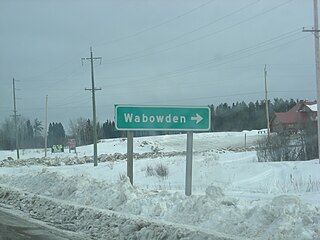
Wabowden is a community in northern Manitoba. It is situated on Provincial Trunk Highway No. 6, which is the main route between Thompson and the provincial capital, Winnipeg.

Mining in Papua New Guinea is an important part of the Papua New Guinea economy.
The Cobalt silver rush was a silver rush in Ontario, Canada that began in 1903 when huge veins of silver were discovered by workers on the Temiskaming and Northern Ontario Railway (T&NO) near the Mile 103 post. By 1905 a full-scale silver rush was underway, and the town of Cobalt, Ontario sprang up to serve as its hub. By 1908 Cobalt produced 9% of the world's silver, and in 1911 produced 31,507,791 ounces of silver. However, the good ore ran out fairly rapidly, and most of the mines were closed by the 1930s. There were several small revivals over the years, notably in World War II and again in the 1950s, but both petered out and today there is no active mining in the area. In total, the Cobalt area mines produced 460 million ounces of silver.
The Stanleigh Mine is an abandoned uranium mine located approximately 3 km northeast of Elliot Lake, Ontario, owned and operated by Rio Algom Ltd. The site has been rehabilitated and is currently undergoing environmental monitoring.
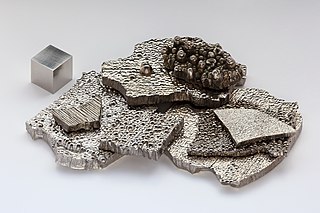
Cobalt is a chemical element; it has symbol Co and atomic number 27. As with nickel, cobalt is found in the Earth's crust only in a chemically combined form, save for small deposits found in alloys of natural meteoric iron. The free element, produced by reductive smelting, is a hard, lustrous, somewhat brittle, gray metal.
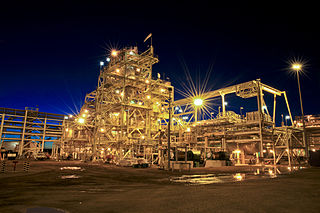
The Ravensthorpe Nickel Mine is a nickel mine and hydrometallurgical processing plant located at Bandalup Hill, 35 km (22 mi) east of Ravensthorpe, Western Australia.

A nickel mine is a mine that produces nickel. Some mines produce nickel primarily, while some mines produce nickel as a side-product of some other metal that has a higher concentration in the ore.
The Fenix nickel project, also known as El Estor mine, is an integrated mountain-top nickel mine and processing facility near El Estor in the Izabal Department of eastern Guatemala. The project consists of a cluster of several deposits with reserves amounting to 36.1 million tonnes of ore grading 1.86% nickel. The project is owned by Solway Group through Guatemalan subsidiaries CGN and Pronico.
The Beta Hunt Mine is a nickel and gold mine near Kambalda in Western Australia. It is owned and operated by Canadian company Karora Resources through a subsidiary named Salt Lake Mining Pty Ltd. The mining tenement is held by Gold Fields Limited and leased to Salt Lake Mining.











